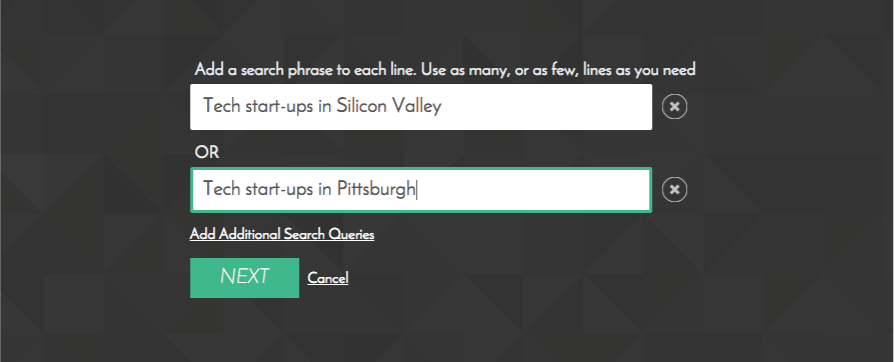How to Create an Effective UpContent Topic
Tips & Tricks
 Marissa Burdett
Marissa Burdett
Tools are only as effective as the user’s knowledge of using them. By learning how to best use our search tool, you will get the most out of your content discovery experience and eliminate the barriers to finding the stuff that matters most.
By learning how to best use our search tool, you will get the most out of your content discovery experience and eliminate the barriers to finding the stuff that matters most.
One of our UpContent users, Sadie, was having trouble receiving the content suggestions she needed. Sadie was very interested in learning more about women in science, but because one of her search queries was simply the word “women,” she was receiving numerous results that lacked the specificity she needed. As a result, she tweaked her search query to include “women in science” and boom! Her results were quickly tailored to just the articles, blog posts, and social posts that she cared about.
Treating your UpContent topic keywords as general Google search queries will generate suggestions of the same general, vague variety. By taking the necessary steps to ensure your topic is clear, concise, and specific, our algorithms will filter out unnecessary results, saving you time sorting in the future and only generating the content that matters most to you.
When you create a topic in UpContent, you are prompted to type in a search phrase. You can add up to ten additional search queries by clicking the “Add additional search queries” link below the box. When you are finished customizing your topic, click the “next” button and give the topic a name to remember its contents.

This process is quick and simple, but without intentional effort in crafting the best search queries, it’s easy to receive lackluster results. When creating your topics, there are a few questions you should ask yourself before settling in on your search terms.
Once you have asked yourself these questions, you are ready to start typing your search queries. Keep the following tips in mind as you go to ensure the best results.
Be specific in each query. Your results will be more effective if you include all of your criteria for each idea in the same search field.
For example, if you want to know about the tech start-ups in Silicon Valley, you should create one specific query to include all of that information to eliminate extraneous results. Write “Tech start ups in Silicon Valley” instead of placing “tech start ups” and “Silicon Valley” on separate lines.
Inversely, treat each search field as an opportunity to broaden the scope of your results. Let’s say you also wanted to learn about tech start-ups in Pittsburgh, you would include that phrase in another search field.

Pay close attention to your results. If you’re finding too many outliers in your content suggestions, it’s probably an indication that your search queries are too broad. You can elect to narrow each query further or utilize the NOT feature to exclude suggestions containing those outliers.
“Tech start-ups (NOT “Silicon Valley”)”
Don’t be afraid to utilize Boolean operators (see below) to ensure accuracy and specificity.
Boolean what? The term might be super fun to say, but it’s even cooler when you use it. If you want to separate yourself from the Average Joe of searches and become a truly effective curator, take a moment to understand how using Boolean operators and quotations can influence how our technology reads your search queries.
Let’s break it down. Boolean operators are spaces, parentheses, quotation marks, and simple words—AND, OR, and NOT—used in conjunction with your search keywords to streamline your results and hone in on the most applicable content.
AND—Use “and” or a space in between keywords to signify that all results need to include both terms. This does not affect the order in which these words are discovered in your results.
Example: Searching for social media AND marketing will yield results pertaining to marketing on various social media platforms.
OR—Use “or” between keywords to signify that results can include either or both terms. This broadens your search.
Example: A search on poodles OR beagles includes results containing, you guessed it, either poodles or beagles or both dog breeds.
NOT—Use “not” between keywords to signify that the first term is to be searched, excluding anything that contains the second search term.
Example: Higher education institutions NOT community college will exempt any community college from the list of higher education results.
Quotation marks—Similar to AND, except whatever you include in quotations will only yield results that include those keywords in their specific order.
Example: Enclosing “Pittsburgh Pirates” in quotation marks will yield specific results about the Major League Baseball team instead of results that contain information about Pittsburgh and pirates.
Parentheses—Remember order of operations from algebra class? Apply the same principle here. Whatever you include in parentheses will be applied first, followed by the other Boolean statements you use.
Example: Hybrid cars AND (Toyota OR Honda) will result in suggestions on Toyota hybrid cars and Honda hybrid cars.
Now that you’ve created a topic, learn more about how you can incorporate sharing that topic in your marketing strategy!
Generating a solid UpContent topic that yields the best results may take a few tweaks, but with strong effort comes valuable results. We want to know: what are the search queries for your favorite topics? Send us a tweet and let us know!